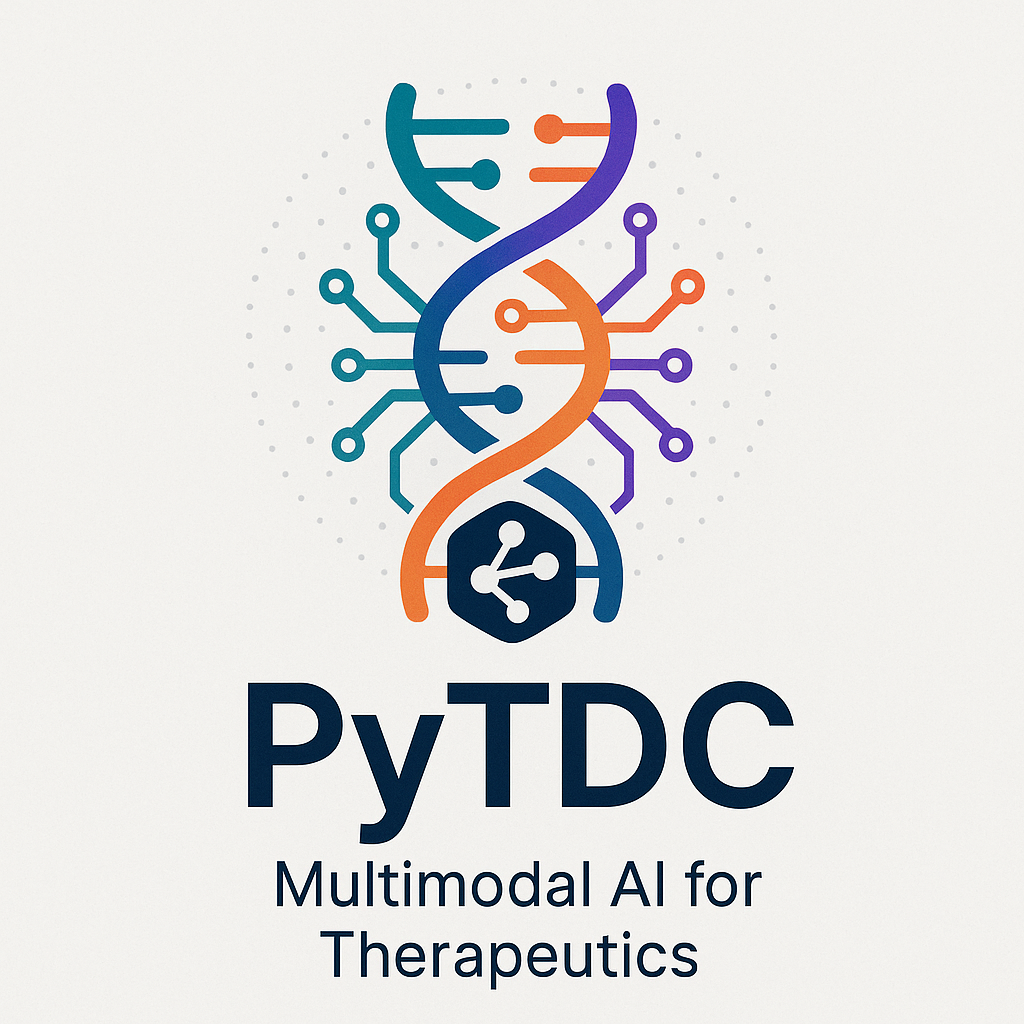ICML 2025 Paper | NeurIPS 2024 AIDrugX Paper
Existing biomedical benchmarks do not provide end-to-end infrastructure for training, evaluation, and inference of models that integrate multimodal biological data and a broad range of machine learning tasks in therapeutics. We present PyTDC, an open-source machine-learning platform providing streamlined training, evaluation, and inference software for multimodal biological AI models. PyTDC unifies distributed, heterogeneous, continuously updated data sources and model weights and standardizes benchmarking and inference endpoints.
The components of PyTDC include:
- A collection of multimodal, continually updated heterogeneous data sources is unified under the introduced "API-first-dataset" architecture. Inspired by API-first design, this microservice architecture uses the model-view-controller design pattern to enable multimodal data views.
- PyTDC presents open-source model retrieval and deployment software that streamlines AI inferencing and exposes state-of-the-art, research-ready models and training setups for biomedical representation learning models across modalities.
- We integrate single-cell analysis with multimodal machine learning in therapeutics via the introduction of contextualized tasks.
PyTDC has forked from Therapeutics Data Commons, a datasets store with ml-ready-datasets in 66 tasks- https://github.com/mims-harvard/TDC
[0] Western Bioinformatics Seminar Series: Alejandro Velez-Arce, "Signals in the Cells: Multimodal and Contextualized Machine Learning Foundations for Therapeutics." [Event] [Seminar] [Slides]
[1] Velez-Arce, Huang, Li, Lin, et al., Signals in the Cells: Multimodal and Contextualized Machine Learning Foundations for Therapeutics, NeurIPS AIDrugX, 2024 [Paper] [Slides] [Webpage]
To install the core environment dependencies of TDC, use pip:
pip install pytdc-nextmlIf you find PyTDC useful, cite our ICML paper and NeurIPS paper:
@inproceedings{
velez-arce2025pytdc,
title={Py{TDC}: A multimodal machine learning training, evaluation, and inference platform for biomedical foundation models},
author={Alejandro Velez-Arce and Marinka Zitnik},
booktitle={Forty-second International Conference on Machine Learning},
year={2025},
url={https://openreview.net/forum?id=HV8vZDDoYc}
}
@inproceedings{
velez-arce2024signals,
title={Signals in the Cells: Multimodal and Contextualized Machine Learning Foundations for Therapeutics},
author={Alejandro Velez-Arce and Xiang Lin and Kexin Huang and Michelle M Li and Wenhao Gao and Bradley Pentelute and Tianfan Fu and Manolis Kellis and Marinka Zitnik},
booktitle={NeurIPS 2024 Workshop on AI for New Drug Modalities},
year={2024},
url={https://openreview.net/forum?id=kL8dlYp6IM}
}
PyTDC is built on top of other open-sourced projects. Additionally, please cite the original work if you used these datasets/functions in your research. You can find the original paper for the function/dataset on the website. For older datasets, please cite the paper:
@article{Huang2021tdc,
title={Therapeutics Data Commons: Machine Learning Datasets and Tasks for Drug Discovery and Development},
author={Huang, Kexin and Fu, Tianfan and Gao, Wenhao and Zhao, Yue and Roohani, Yusuf and Leskovec, Jure and Coley,
Connor W and Xiao, Cao and Sun, Jimeng and Zitnik, Marinka},
journal={Proceedings of Neural Information Processing Systems, NeurIPS Datasets and Benchmarks},
year={2021}
}
Many PyTDC datasets are hosted on Harvard Dataverse with the following persistent identifier https://doi.org/10.7910/DVN/21LKWG. When Dataverse is under maintenance, PyTDC datasets cannot be retrieved. That happens rarely; please check the status on the Dataverse website.
The PyTDC codebase is licensed under the MIT license. For individual dataset usage, please refer to the dataset license on the website.








.png)